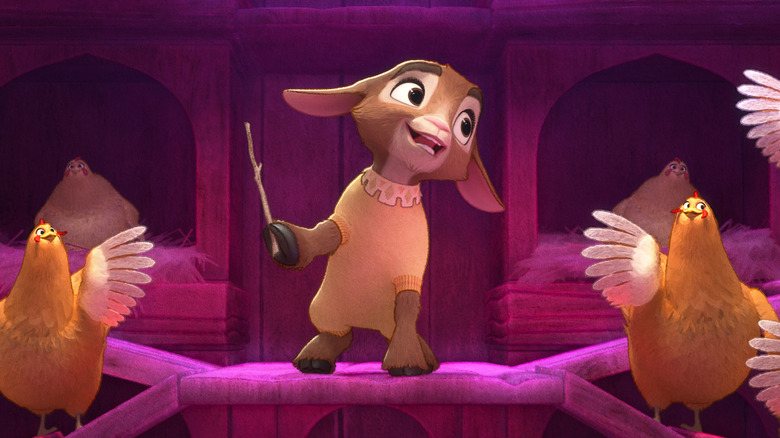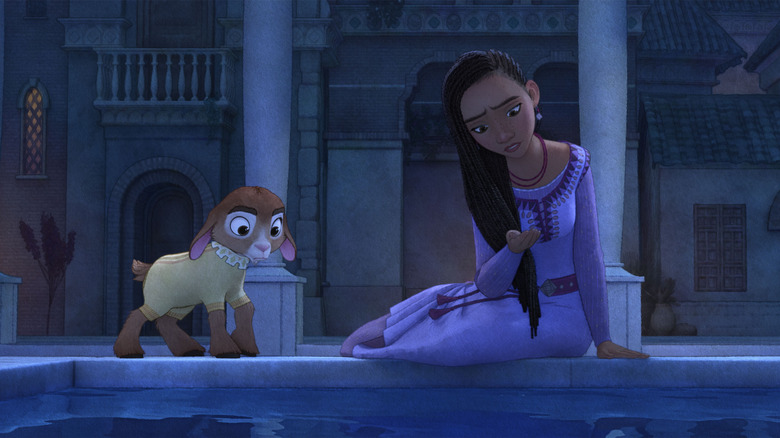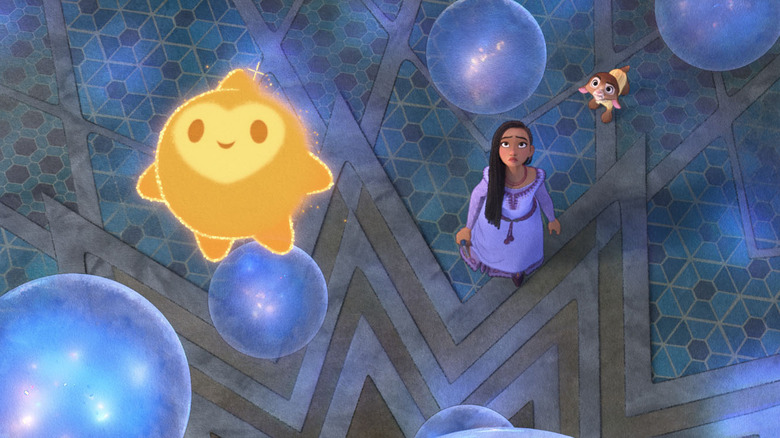Disney's Wish Will Not Pull An Elemental At The Box Office
2023 is just not Disney's year. While there have been some major animated hits at the box office for other studios — from the monster success of "The Super Mario Bros. Movie" to the $690 million gross of "Spider-Man: Across the Spider-Verse — things aren't looking so good for the studio that once delivered megahits like "The Lion King" and "Beauty and the Beast."
Disney celebrated its 100th anniversary with the release of "Wish," a new animated musical about following your dreams, and wishing upon a star and ... there's a talking goat, and ... Well, it's actually a bit hard to explain what "Wish" is about, which might be one reason why the film is struggling at the box office. After falling short of expectations during its Thanksgiving debut, opening in third place behind "The Hunger Games: A Ballad of Songbirds & Snakes" and "Napoleon," "Wish" has now dropped 61% in its second weekend, grossing just $7.7 million at the domestic box office. After almost two weeks in theaters, it has grossed just $81.8 million worldwide against a production budget of $200 million.
Despite last week's disappointing start, "Wish" was still within a shot at recovery, as proven earlier this year by Disney and Pixar's "Elemental." That film grossed an underwhelming $29.6 million on its opening weekend, but positive reviews, strong overseas performance, and a lack of competition from other family-friendly animated fare eventually carried it to $495.9 million worldwide. Its second-weekend drop was a mere 37.7%, and it even re-expanded to more screens over Labor Day weekend. Unfortunately for Disney, "Wish" isn't having the same luck.
What went wrong with Wish?
"Wish" wasn't just weighed down by the pressures of a $200 million budget; it was also saddled with the responsibility of celebrating 100 years of Disney animation and truly capturing the Disney brand. That might sound great in a boardroom, but creatively it's a recipe for storytelling by committee. From a central princess-type character, to a talking animal sidekick, to a story based around the concept of wishing on a star (a nod to the signature song of the Walt Disney Company), "Wish" is packed with Easter eggs. But, as noted by /Film's Josh Spiegel in his review, "it makes the mistake of constantly reminding its audience of the beauty and brilliance of Disney's past, without offering any new charms of its own."
This was the consensus among many critics. The film holds a score of just 48% on Rotten Tomatoes and received an A- CinemaScore from audience exit polling, which is low for a family-friendly animated feature that was designed to be a crowd-pleaser. The film's story problems bled into the marketing, as the trailers struggled to find an interesting hook to entice audiences. No one wants to watch a 90-minute commercial for a media conglomerate.
Add in a release date jostled by competition from a new "Hunger Games" prequel and a new "Trolls" sequel, and it's easy to see why "Wish" failed to make it out of the stratosphere.
A mouse frozen in the headlights
Ultimately the problem with "Wish" is the same problem that has been plaguing Disney for some time now, and which reached critical mass this year: risk aversion. This is a known bug of big companies, and the problem only grows as companies get bigger and answerable to more shareholders. Risk aversion was arguably the downfall of Nokia; in 2004, Nokia had the largest market share for cell phones, but had experienced a dip as competitors started to roll out fold-away devices. In an effort to innovate, research engineers created a prototype for a new type of phone — one with a large display and no buttons, operated entirely through a touch-screen.
"It was an expensive device to produce, so there was more risk involved for Nokia," a former employee later told the New York Times in 2010. "So management did the usual. They killed it." Three years later, Apple released the first iPhone.
"Barbie" is the highest-grossing movie of 2023, but despite its famous leading lady, it was still a big risk for Warner Bros. Pictures. "There was absolutely nothing to point to before," director Greta Gerwig recently explained. "We weren't able to use anything as what they call a 'comp.' That's how they build budgets, and they assess risk."
For most of the 21st century so far, Disney has been buying up other companies with successful existing franchises (Marvel, Lucasfilm, 20th Century Fox) and remaking its own classics in live-action. What the company hasn't really been doing is taking a lot of risks. Even its riskiest move, the creation of Disney+, was reminiscent of Nokia scrambling to release a touch-screen phone after Apple got there first. With animated offerings struggling and once-reliable franchises like Marvel delivering diminishing returns, Disney may go the way of Nokia and IBM if the studio doesn't start taking risks again.


